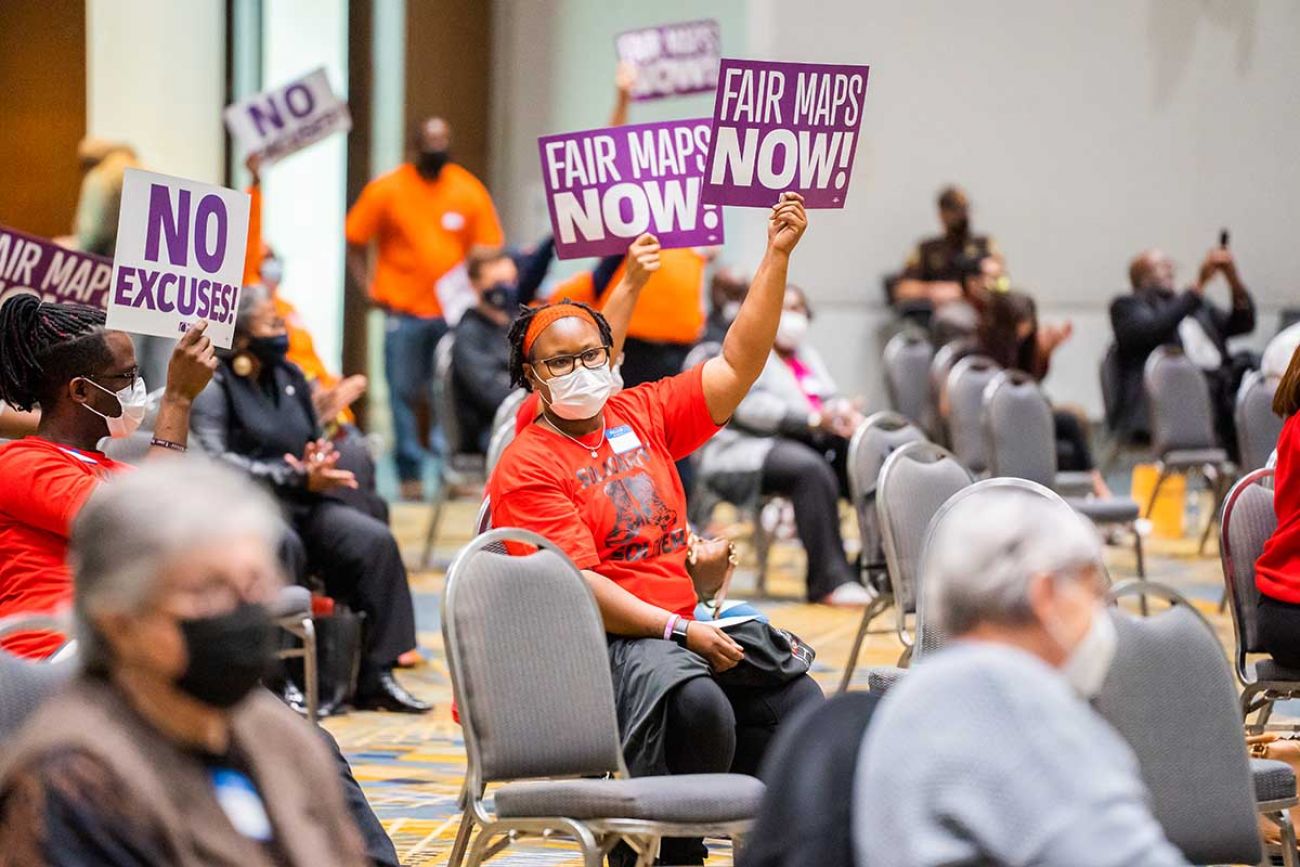Lawmakers, news outlets blast ongoing secrecy of Michigan redistricting panel

LANSING— Michigan’s redistricting panel has continued to keep private information members used to draw districts in Detroit, prompting complaints that members are betraying their own transparency promises.
Last week, Bridge Michigan and the Michigan Press Association issued a joint letter to the Michigan Independent Citizens Redistricting Commission asking it to immediately make public two attorney memos discussed behind closed-doors on Oct. 27.
The memos were titled "Voting Rights Act” and “The History of Discrimination in the State of Michigan and its Influence on Voting.”
Related:
- Michigan’s redistricting panel advances maps. Is Legislature shake-up next?
- Michigan redistricting commission relents, creates majority-Black maps for House
- Republicans have edge, but Michigan House drafts include plenty of surprises
The discussion of the memos happened as the panel received pressure from Black residents to create majority-Black districts in the state.
“Discussing issues as vital as minority representation in private violates the spirit, if not the letter, of the law — and sullies an otherwise grand experiment in open government and democracy,” John Bebow, the president and CEO of The Center for Michigan, the nonprofit that operates Bridge Michigan, and Lisa McGraw, the manager of the Michigan Press Association, wrote on Nov. 5.
On Friday, Julianne Pastula, the panel’s general counsel, said it was treating the letter as a records request under the Michigan Freedom of Information Act. She said a response would be issued by Dec. 2, which could delay release for three weeks.
This is significant, since the commission is about to enter a 45-day public comment period for the maps they constructed with information most likely to appear in the two memorandums discussed behind closed doors.
The 13-member panel was conceived in 2018 after activists pushed for a more transparent and open process to draw district boundaries for state House and Senate and congressional districts.
Previously, the party in power at the Michigan Legislature would draw the lines in secret. This led to some of the most gerrymandered districts in the country.
Bridge Michigan asked on Oct. 27 for all or part of the memos discussed, but the commission’s communications director, Edward Woods III, declined to provide them.
In a follow-up email to Pastula and the commission’s executive director Sue Hammersmith Friday, Bebow said the commission was acting like the “Moscow Redistricting Commission.”
“Frankly, Ms. Pastula and Ms. Hammersmith, hiding these documents and discussions behind closed doors is total bullshit,” Bebow wrote. “Do your jobs and release the documents.”
In an interview, Bebow said the redistricting commission should be held to the highest standards of transparency.
McGraw agreed, telling Bridge Michigan Friday the Michigan Press Association is “gravely concerned about the transparency problems with the commission.”
According to the Michigan Freedom of Information Act, public bodies may exempt information or records subject to attorney-client privilege.
Woods told reporters recently that the commission has exempted a total of 10 memos from disclosure due to the attorney-client privilege. They include memos with the title “Memorandum Regarding Renumbering of Electoral Districts,” and “Redistricting Criteria.”
Steve Liedel, an attorney who worked as legal counsel to former Democratic Gov. Jennifer Granholm, told Bridge Michigan there might be portions of the memos that are not subject to the privilege “which means they're obligated to disclose them.”
“There's information that is not privileged information, just like for example, facts or background, past voting discrimination in Michigan,” Liedel said. “How was that attorney client privilege instead of any sort of legal advice? That's just factual information.”
Liedel said it's unclear when or whether the commission voted as a body to exempt these memos from disclosure.
The memos were discussed as Detroiters kept asking the commission to draw majority-Black districts in the Detroit area.
The commission had been following the advice of its partisan fairness expert and its voting rights attorney, who recommended creating districts in Detroit with a Black population between 40 percent and 45 percent, arguing that anything more could be deemed racial gerrymandering. Detroit is 78 percent Black.
But last week, Adelson said the commission could draw districts that have a Black voting age population of up to 55 percent, as long as it's not meant to dilute their vote and protects communities of interest.
Sen. Adam Hollier, D-Detroit, told Bridge Michigan Friday he believes the commission’s attorneys have misguided the panel.
“There are fundamental issues: partisan fairness, complying with the Voting Rights Act and communities of interest. Those are the three things that people have talked about,” Hollier said. “Only one of them has been decided in secret and that's (compliance with) the Voting Rights Act.”
Hollier is not the only lawmaker to complain about the commission’s secrecy regarding these memos.
Sens. Jeff Irwin, D-Ann Arbor, and Ed McBroom, R-Vulcan, recently asked Attorney General Dana Nessel, a Democrat, to weigh in on whether the commission violated the state constitution by entering into a closed meeting on Oct. 27.
The constitution mandates the commission to “conduct all of its business at open meetings.” The commission cited the Open Meetings Act when going into closed session.
McBroom told Bridge Michigan the commission’s business should be discussed in public.
“Transparency for the public on a publicly-funded body is determined by what we hear those discussions are and how they got to the result that they choose to take,” McBroom said.
Nessel’s office didn’t immediately respond to a request for comment.
News executives have also blasted the commission over its secrecy.
Gary Miles, the publisher of the Detroit News, sent a letter to the commission last week also requesting “any documents discussed or minutes taken” during the October closed-door meeting.
Miles also asked the commission to conduct all of its meetings in open sessions.
He told Bridge Michigan Friday his organization believes the redistricting process should be as transparent as possible.
“This is a critical juncture for the trust voters have in government, because the lines drawn here will impact their representation for 10 years,” Miles said. “Without question, we believe that the more open this commission is, then the more trust people will have in its results.”
See what new members are saying about why they donated to Bridge Michigan:
- “In order for this information to be accurate and unbiased it must be underwritten by its readers, not by special interests.” - Larry S.
- “Not many other media sources report on the topics Bridge does.” - Susan B.
- “Your journalism is outstanding and rare these days.” - Mark S.
If you want to ensure the future of nonpartisan, nonprofit Michigan journalism, please become a member today. You, too, will be asked why you donated and maybe we'll feature your quote next time!




